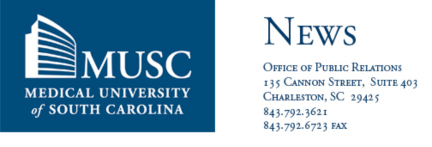
Dec. 14, 2011
CHARLESTON -- South Carolinaís Sea Island black population may hold answers to why African Americans in the US develop and die from certain cancers at a higher rate than Caucasians.
A landmark grant awarded recently by the National Institutes of Health (NIH) and the NIHís National Cancer Institute to the Hollings Cancer Center at the Medical University of South Carolina (MUSC) and South Carolina State University is among the first of its kind in the country to support cancer disparities research that includes Sea Island residents.
The grant, exceeding $800,000, establishes the South Carolina Cancer Disparities Research Center (SC CaDRe) which will have as its mission investigating cancer disparities and training future researchers in the field. Researchers from both institutions will collaborate on both aspects.
"The more we know about how genetic makeup contributes to cancer onset and progression, the better we will be able to develop drugs targeted toward each personís genetic make-up, which will give us greater ammunition in our cancer-fighting arsenal," said principal investigator Marvella Ford, PhD, associate director of cancer disparities at the Hollings Cancer Center.
Judith Salley, PhD, chair of the Department of Biological Sciences at South Carolina State University and co-principal investigator on the grant, said, "In addition to conducting research that could lead to improved cancer treatment, the grant will also develop the careers of the next generation of cancer disparities researchers by training undergraduate students from SCSU, graduate students from MUSC, and junior faculty from both institutions."
Grant and research highlights:
•African Americans from the Sea Islands are the most homogeneous black population in the US. They are direct descendants of Africans removed by force from West Africa, primarily from Sierra Leone.
•The genetic distance between the Sea Island populations and those in Sierra Leone is shorter than between Sea Island populations and African American populations in the US.
•Other ethnic groups included in the research will be African Americans who do not have Sea Island ancestry and Caucasians who have been diagnosed with cancer.
•Another unique element of the grant is the formation of an advisory group, including Sea Island community advocates, which will help select research projects conducted.
•Research will initially focus on breast and prostate cancers, two types of cancer that affect African Americans and Caucasians at markedly disproportionate rates. Studies will explore whether genetic differences play a role in disparities.
About Hollings Cancer Center
Hollings Cancer Center at the Medical University of South Carolina is a National Cancer Institute-designated cancer center and the largest academic-based cancer program in South Carolina. The cancer center has more than $35 million in cancer research funding and more than 200 people are currently participating on a cancer clinical trial at Hollings Cancer Center. Hollings offers state-of-the-art diagnostic capabilities, therapies and surgical techniques and has multidisciplinary clinics that include surgeons, medical oncologists, radiation therapists, radiologists, pathologists, psychologists and many other specialists seeing patients under one roof. Multidisciplinary care is provided for most adult and pediatric cancers. For more information please visit www.hcc.musc.edu.
About MUSC
Founded in 1824 in Charleston, The Medical University of South Carolina is the oldest medical school in the South. Today, MUSC continues the tradition of excellence in education, research, and patient care. MUSC educates and trains more than 3,000 students and residents, and has nearly 11,000 employees, including 1,500 faculty members. As the largest non-federal employer in Charleston, the university and its affiliates have collective annual budgets in excess of $1.7 billion. MUSC operates a 750-bed medical center, which includes a nationally recognized Children's Hospital, the Ashley River Tower (cardiovascular, digestive disease, and surgical oncology), and a leading Institute of Psychiatry. For more information on academic information or clinical services, visit www.musc.edu or www.muschealth.com.
#####